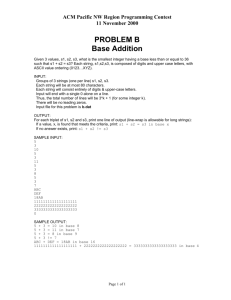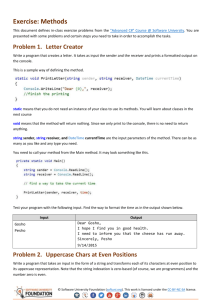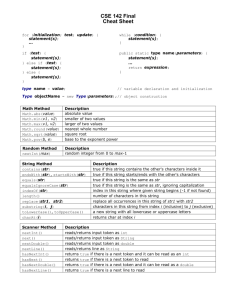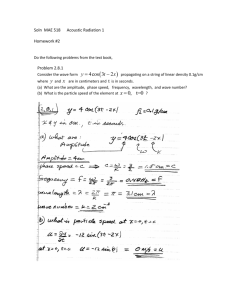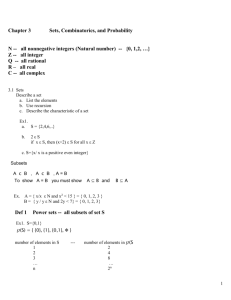Codingbat Python Solutions: Warmup, String, List, Logic
advertisement
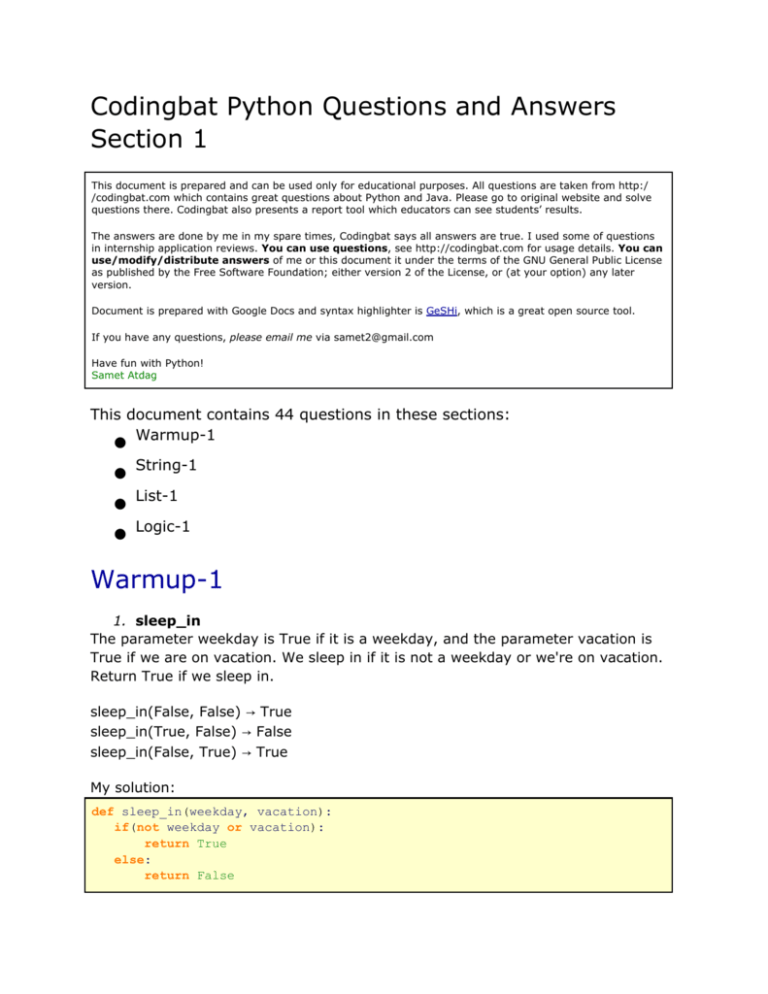
Codingbat Python Questions and Answers
Section 1
This document is prepared and can be used only for educational purposes. All questions are taken from http:/
/codingbat.com which contains great questions about Python and Java. Please go to original website and solve
questions there. Codingbat also presents a report tool which educators can see students’ results.
The answers are done by me in my spare times, Codingbat says all answers are true. I used some of questions
in internship application reviews. You can use questions, see http://codingbat.com for usage details. You can
use/modify/distribute answers of me or this document it under the terms of the GNU General Public License
as published by the Free Software Foundation; either version 2 of the License, or (at your option) any later
version.
Document is prepared with Google Docs and syntax highlighter is GeSHi, which is a great open source tool.
If you have any questions, please email me via samet2@gmail.com
Have fun with Python!
Samet Atdag
This document contains 44 questions in these sections:
Warmup-1
●
● String-1
● List-1
● Logic-1
Warmup-1
1. sleep_in
The parameter weekday is True if it is a weekday, and the parameter vacation is
True if we are on vacation. We sleep in if it is not a weekday or we're on vacation.
Return True if we sleep in.
sleep_in(False, False) → True
sleep_in(True, False) → False
sleep_in(False, True) → True
My solution:
def sleep_in(weekday, vacation):
if(not weekday or vacation):
return True
else:
return False
2. monkey_trouble
We have two monkeys, a and b, and the parameters a_smile and b_smile indicate
if each is smiling. We are in trouble if they are both smiling or if neither of them is
smiling. Return True if we are in trouble.
monkey_trouble(True, True) → True
monkey_trouble(False, False) → True
monkey_trouble(True, False) → False
My solution:
def monkey_trouble(a_smile, b_smile):
if((a_smile and b_smile) or ((not a_smile) and (not b_smile))):
return True
else:
return False
3. sum_double
Given two int values, return their sum. Unless the two values are the same, then
return double their sum.
sum_double(1, 2) → 3
sum_double(3, 2) → 5
sum_double(2, 2) → 8
My solution:
def sum_double(a, b):
result = a+b
if(a == b):
result = 2*result
return result
4. diff21
Given an int n, return the absolute difference between n and 21, except return
double the absolute difference if n is over 21.
diff21(19) → 2
diff21(10) → 11
diff21(21) → 0
My solution:
def diff21(n):
if n>21:
result = 2*(n-21)
else:
result = 21-n
return result
5. parrot_trouble
We have a loud talking parrot. The "hour" parameter is the current hour time in the
range 0..23. We are in trouble if the parrot is talking and the hour is before 7 or
after 20. Return True if we are in trouble.
parrot_trouble(True, 6) → True
parrot_trouble(True, 7) → False
parrot_trouble(False, 6) → False
My solution:
def parrot_trouble(talking, hour):
if talking:
if hour<7 or hour>20:
return True
else:
return False
else:
return False
6. makes10
Given 2 ints, a and b, return True if one if them is 10 or if their sum is 10.
makes10(9, 10) → True
makes10(9, 9) → False
makes10(1, 9) → True
My solution:
def makes10(a, b):
if a==10 or b==10 or a+b==10:
return True
else:
return False
7. near_hundred
Given an int n, return True if it is within 10 of 100 or 200. Note: abs(num)
computes the absolute value of a number.
near_hundred(93) → True
near_hundred(90) → True
near_hundred(89) → False
My solution:
def near_hundred(n):
if abs(100-n)<=10 or abs(200-n)<=10:
return True
else:
return False
8. pos_neg
Given 2 int values, return True if one is negative and one is positive. Unless the
parameter "negative" is True, then they both must be negative.
pos_neg(1, -1, False) → True
pos_neg(-1, 1, False) → True
pos_neg(1, 1, False) → False
My solution:
def pos_neg(a, b, negative):
if negative:
return (a < 0 and b < 0)
else:
return ((a < 0 and b > 0) or (a > 0 and b < 0))
9. not_string
Given a string, return a new string where "not " has been added to the front.
However, if the string already begins with "not", return the string unchanged.
not_string('candy') → 'not candy'
not_string('x') → 'not x'
not_string('not bad') → 'not bad'
My solution:
def not_string(str):
a = str.split('not')
if len(a) > 1 and a[0]=="":
return str
else:
return "not " + str
10.missing_char
Given a non-empty string and an int n, return a new string where the char at index
n has been removed. The value of n will be a valid index of a char in the original
string (i.e. n will be in the range 0..len(str)-1 inclusive).
missing_char('kitten', 1) → 'ktten'
missing_char('kitten', 0) → 'itten'
missing_char('kitten', 4) → 'kittn'
My solution:
def missing_char(str, n):
return str[0:n] + str[n+1:]
11.front_back
Given a string, return a new string where the first and last chars have been
exchanged.
front_back('code') → 'eodc'
front_back('a') → 'a'
front_back('ab') → 'ba'
My solution:
def front_back(str):
if len(str) == 1:
return str
elif len(str) == 2:
return str[1] + str[0]
else:
return str[-1:] + str[1:-1] + str[:1]
12.front3
Given a string, we'll say that the front is the first 3 chars of the string. If the string
length is less than 3, the front is whatever is there. Return a new string which is 3
copies of the front.
front3('Java') → 'JavJavJav'
front3('Chocolate') → 'ChoChoCho'
front3('abc') → 'abcabcabc'
My solution:
def front3(str):
if len(str) < 3:
return str+str+str
else:
return str[:3] + str[:3] + str[:3]
String-1
13.hello_name
Given a string name, e.g. "Bob", return a greeting of the form "Hello Bob!".
hello_name('Bob') → 'Hello Bob!'
hello_name('Alice') → 'Hello Alice!'
hello_name('X') → 'Hello X!'
My solution:
def hello_name(name):
return "Hello " + name + "!"
14.make_abba
Given two strings, a and b, return the result of putting them together in the order
abba, e.g. "Hi" and "Bye" returns "HiByeByeHi".
make_abba('Hi', 'Bye') → 'HiByeByeHi'
make_abba('Yo', 'Alice') → 'YoAliceAliceYo'
make_abba('x', 'y') → 'xyyx'
My solution:
def make_abba(a, b):
return a + b + b + a
15.make_tags
The web is built with HTML strings like "<i>Yay</i>" which draws Yay as italic text.
In this example, the "i" tag makes <i> and </i> which surround the word "Yay".
Given tag and word strings, create the HTML string with tags around the word,
e.g. "<i>Yay</i>".
make_tags('i', 'Yay') → '<i>Yay</i>'
make_tags('i', 'Hello') → '<i>Hello</i>'
make_tags('cite', 'Yay') → '<cite>Yay</cite>'
My solution:
def make_tags(tag, word):
return "<" + tag + ">" + word + "</" + tag + ">"
16.make_out_word
Given an "out" string length 4, such as "<<>>", and a word, return a new string
where the word is in the middle of the out string, e.g. "<<word>>".
make_out_word('<<>>', 'Yay') → '<<Yay>>'
make_out_word('<<>>', 'WooHoo') → '<<WooHoo>>'
make_out_word('[[]]', 'word') → '[[word]]'
My solution:
def make_out_word(out, word):
return out[0:2] + word + out[2:]
17.extra_end
Given a string, return a new string made of 3 copies of the last 2 chars of the
original string. The string length will be at least 2.
extra_end('Hello') → 'lololo'
extra_end('ab') → 'ababab'
extra_end('Hi') → 'HiHiHi'
My solution:
def extra_end(str):
return 3*(str[-2:])
18.first_two
Given a string, return the string made of its first two chars, so the String "Hello"
yields "He". If the string is shorter than length 2, return whatever there is, so "X"
yields "X", and the empty string "" yields the empty string "".
first_two('Hello') → 'He'
first_two('abcdefg') → 'ab'
first_two('ab') → 'ab'
My solution:
def first_two(str):
if len(str) < 2:
return str
else:
return str[0:2]
19.first_half
Given a string of even length, return the first half. So the string "WooHoo"
yields "Woo".
first_half('WooHoo') → 'Woo'
first_half('HelloThere') → 'Hello'
first_half('abcdef') → 'abc'
My solution:
def first_half(str):
return str[0:len(str)/2]
20.without_end
Given a string, return a version without the first and last char, so "Hello"
yields "ell". The string length will be at least 2.
without_end('Hello') → 'ell'
without_end('java') → 'av'
without_end('coding') → 'odin'
My solution:
def without_end(str):
return str[1:-1]
21.combo_string
Given 2 strings, a and b, return a string of the form short+long+short, with the
shorter string on the outside and the longer string on the inside. The strings will not
be the same length, but they may be empty (length 0).
combo_string('Hello', 'hi') → 'hiHellohi'
combo_string('hi', 'Hello') → 'hiHellohi'
combo_string('aaa', 'b') → 'baaab'
My solution:
def combo_string(a, b):
if len(a)<len(b):
return a+b+a
else:
return b+a+b
22.non_start
Given 2 strings, return their concatenation, except omit the first char of each. The
strings will be at least length 1.
non_start('Hello', 'There') → 'ellohere'
non_start('java', 'code') → 'avaode'
non_start('shotl', 'java') → 'hotlava'
My solution:
def non_start(a, b):
return a[1:] + b[1:]
23.left2
Given a string, return a "rotated left 2" version where the first 2 chars are moved to
the end. The string length will be at least 2.
left2('Hello') → 'lloHe'
left2('java') → 'vaja'
left2('Hi') → 'Hi'
My solution:
def left2(str):
return str[2:] + str[0:2]
List-1
24.first_last6
Given an array of ints, return True if 6 appears as either the first or last element in
the array. The array will be length 1 or more.
first_last6([1, 2, 6]) → True
first_last6([6, 1, 2, 3]) → True
first_last6([3, 2, 1]) → False
My solution:
def first_last6(nums):
if (nums[0] == 6) or (nums[len(nums)-1] == 6):
return True
else:
return False
25.same_first_last
Given an array of ints, return True if the array is length 1 or more, and the first
element and the last element are the same.
same_first_last([1, 2, 3]) → False
same_first_last([1, 2, 3, 1]) → True
same_first_last([1, 2, 1]) → True
My solution:
def same_first_last(nums):
if len(nums)>0:
if nums[0] == nums[len(nums) - 1]:
return True
else:
return False
else:
return False
26.make_pi
Return an int array length 3 containing the first 3 digits of pi, {3, 1, 4}.
make_pi() → [3, 1, 4]
My solution:
def make_pi():
return [3,1,4]
27.common_end
Given 2 arrays of ints, a and b, return True if they have the same first element or
they have the same last element. Both arrays will be length 1 or more.
common_end([1, 2, 3], [7, 3]) → True
common_end([1, 2, 3], [7, 3, 2]) → False
common_end([1, 2, 3], [1, 3]) → True
My solution:
def common_end(a, b):
if (a[0] == b[0]) or (a[len(a)-1] == b[len(b)-1]):
return True
else:
return False
28.sum3
Given an array of ints length 3, return the sum of all the elements.
sum3([1, 2, 3]) → 6
sum3([5, 11, 2]) → 18
sum3([7, 0, 0]) → 7
My solution:
def sum3(nums):
return nums[0]+nums[1]+nums[2]
29.rotate_left3
Given an array of ints length 3, return an array with the elements "rotated left" so
{1, 2, 3} yields {2, 3, 1}.
rotate_left3([1, 2, 3]) → [2, 3, 1]
rotate_left3([5, 11, 9]) → [11, 9, 5]
rotate_left3([7, 0, 0]) → [0, 0, 7]
My solution:
def rotate_left3(nums):
return [nums[1], nums[2], nums[0]]
30.reverse3
Given an array of ints length 3, return a new array with the elements in reverse
order, so {1, 2, 3} becomes {3, 2, 1}.
reverse3([1, 2, 3]) → [3, 2, 1]
reverse3([5, 11, 9]) → [9, 11, 5]
reverse3([7, 0, 0]) → [0, 0, 7]
My solution:
def reverse3(nums):
return [nums[2], nums[1], nums[0]]
31.max_end3
Given an array of ints length 3, figure out which is larger between the first and last
elements in the array, and set all the other elements to be that value. Return the
changed array.
max_end3([1, 2, 3]) → [3, 3, 3]
max_end3([11, 5, 9]) → [11, 11, 11]
max_end3([2, 11, 3]) → [3, 3, 3]
My solution:
def max_end3(nums):
if nums[0]>nums[2]:
return [nums[0],nums[0],nums[0]]
else:
return [nums[2],nums[2],nums[2]]
32.sum2
Given an array of ints, return the sum of the first 2 elements in the array. If the
array length is less than 2, just sum up the elements that exist, returning 0 if the
array is length 0.
sum2([1, 2, 3]) → 3
sum2([1, 1]) → 2
sum2([1, 1, 1, 1]) → 2
My solution:
def sum2(nums):
if len(nums) == 0:
return 0
elif len(nums) == 1:
return nums[0]
else:
return nums[0] + nums[1]
33.middle_way
Given 2 int arrays, a and b, each length 3, return a new array length 2 containing
their middle elements.
middle_way([1, 2, 3], [4, 5, 6]) → [2, 5]
middle_way([7, 7, 7], [3, 8, 0]) → [7, 8]
middle_way([5, 2, 9], [1, 4, 5]) → [2, 4]
My solution:
def middle_way(a, b):
return [a[1],b[1]]
34.make_ends
Given an array of ints, return a new array length 2 containing the first and last
elements from the original array. The original array will be length 1 or more.
make_ends([1, 2, 3]) → [1, 3]
make_ends([1, 2, 3, 4]) → [1, 4]
make_ends([7, 4, 6, 2]) → [7, 2]
My solution:
def make_ends(nums):
return [nums[0], nums[-1]]
35.has23
Given an int array length 2, return True if it contains a 2 or a 3.
has23([2, 5]) → True
has23([4, 3]) → True
has23([4, 5]) → False
My solution:
def has23(nums):
if 2 in nums or 3 in nums:
return True
else:
return False
Logic-1
36.cigar_party
When squirrels get together for a party, they like to have cigars. A squirrel party
is successful when the number of cigars is between 40 and 60, inclusive. Unless
it is the weekend, in which case there is no upper bound on the number of cigars.
Return True if the party with the given values is successful, or False otherwise.
cigar_party(30, False) → False
cigar_party(50, False) → True
cigar_party(70, True) → True
My solution:
def cigar_party(cigars, is_weekend):
if is_weekend:
if cigars>=40:
return True
else:
return False
else:
if cigars>=40 and cigars<=60:
return True
else:
return False
37.date_fashion
You and your date are trying to get a table at a restaurant. The parameter "you"
is the stylishness of your clothes, in the range 0..10, and "date" is the stylishness
of your date's clothes. The result getting the table is encoded as an int value with
0=no, 1=maybe, 2=yes. If either of you is very stylish, 8 or more, then the result
is 2 (yes). With the exception that if either of you has style of 2 or less, then the
result is 0 (no). Otherwise the result is 1 (maybe).
date_fashion(5, 10) → 2
date_fashion(5, 2) → 0
date_fashion(5, 5) → 1
My solution:
def date_fashion(you, date):
if you<=2 or date<=2:
return 0
elif you>=8 or date>=8:
return 2
else:
return 1
38.squirrel_play
The squirrels in Palo Alto spend most of the day playing. In particular, they play
if the temperature is between 60 and 90 (inclusive). Unless it is summer, then
the upper limit is 100 instead of 90. Given an int temperature and a boolean
is_summer, return True if the squirrels play and False otherwise.
squirrel_play(70, False) → True
squirrel_play(95, False) → False
squirrel_play(95, True) → True
My solution:
def squirrel_play(temp, is_summer):
upper = 90
if is_summer:
upper = 100
return (temp>=60 and temp<=upper)
39.caught_speeding
You are driving a little too fast, and a police officer stops you. Write code to
compute the result, encoded as an int value: 0=no ticket, 1=small ticket, 2=big
ticket. If speed is 60 or less, the result is 0. If speed is between 61 and 80
inclusive, the result is 1. If speed is 81 or more, the result is 2. Unless it is your
birthday -- on that day, your speed can be 5 higher in all cases.
caught_speeding(60, False) → 0
caught_speeding(65, False) → 1
caught_speeding(65, True) → 0
My solution:
def caught_speeding(speed, is_birthday):
gift = 0
if is_birthday:
gift = 5
if speed <= 60+gift:
return 0
elif speed >= 81+gift:
return 2
else:
return 1
40.sorta_sum
Given 2 ints, a and b, return their sum. However, sums in the range 10..19
inclusive, are forbidden, so in that case just return 20.
sorta_sum(3, 4) → 7
sorta_sum(9, 4) → 20
sorta_sum(10, 11) → 21
My solution:
def sorta_sum(a, b):
total = a+b
if total > 9 and total < 20:
return 20
else:
return total
41.alarm_clock
Given a day of the week encoded as 0=Sun, 1=Mon, 2=Tue, ...6=Sat, and
a boolean indicating if we are on vacation, return a string of the form "7:00"
indicating when the alarm clock should ring. Weekdays, the alarm should be "7:00"
and on the weekend it should be "10:00". Unless we are on vacation -- then on
weekdays it should be "10:00" and weekends it should be "off".
alarm_clock(1, False) → '7:00'
alarm_clock(5, False) → '7:00'
alarm_clock(0, False) → '10:00'
My solution:
def alarm_clock(day, vacation):
weekday_alarm = "7:00"
weekend_alarm = "10:00"
if vacation:
weekday_alarm = "10:00"
weekend_alarm = "off"
if day>0 and day<6:
return weekday_alarm
else:
return weekend_alarm
42.love6
The number 6 is a truly great number. Given two int values, a and b, return True
if either one is 6. Or if their sum or difference is 6. Note: the function abs(num)
computes the absolute value of a number.
love6(6, 4) → True
love6(4, 5) → False
love6(1, 5) → True
My solution:
def love6(a, b):
if a==6 or b==6 or a+b==6 or abs(a-b)==6:
return True
return False
43.in1to10
Given a number n, return True if n is in the range 1..10, inclusive.
Unless "outsideMode" is True, in which case return True if the number is less or
equal to 1, or greater or equal to 10.
in1to10(5, False) → True
in1to10(11, False) → False
in1to10(11, True) → True
My solution:
def in1to10(n, outside_mode):
if not outside_mode:
return (n>=1 and n<=10)
else:
return (n<=1 or n>=10)
44.near_ten
Given a non-negative number "num", return True if num is within 2 of a multiple of
10. Note: (a % b) is the remainder of dividing a by b, so (7 % 5) is 2.
near_ten(12) → True
near_ten(17) → False
near_ten(19) → True
My solution:
def near_ten(num):
return (num%10==0 or num%10==1 or num%10==2 or abs(10-num%10)==2 or abs(10num%10)==1 or abs(10-num%10)==0)
